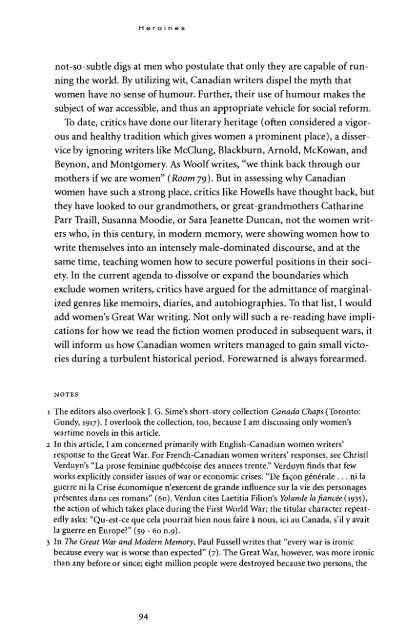Jean Rivard - University of British Columbia
Jean Rivard - University of British Columbia
Jean Rivard - University of British Columbia
You also want an ePaper? Increase the reach of your titles
YUMPU automatically turns print PDFs into web optimized ePapers that Google loves.
Heroines<br />
not-so-subtle digs at men who postulate that only they are capable <strong>of</strong> running<br />
the world. By utilizing wit, Canadian writers dispel the myth that<br />
women have no sense <strong>of</strong> humour. Further, their use <strong>of</strong> humour makes the<br />
subject <strong>of</strong> war accessible, and thus an appropriate vehicle for social reform.<br />
To date, critics have done our literary heritage (<strong>of</strong>ten considered a vigorous<br />
and healthy tradition which gives women a prominent place), a disservice<br />
by ignoring writers like McClung, Blackburn, Arnold, McKowan, and<br />
Beynon, and Montgomery. As Woolf writes, "we think back through our<br />
mothers if we are women" (Room 79). But in assessing why Canadian<br />
women have such a strong place, critics like Howells have thought back, but<br />
they have looked to our grandmothers, or great-grandmothers Catharine<br />
Parr Traill, Susanna Moodie, or Sara <strong>Jean</strong>ette Duncan, not the women writers<br />
who, in this century, in modern memory, were showing women how to<br />
write themselves into an intensely male-dominated discourse, and at the<br />
same time, teaching women how to secure powerful positions in their society.<br />
In the current agenda to dissolve or expand the boundaries which<br />
exclude women writers, critics have argued for the admittance <strong>of</strong> marginalized<br />
genres like memoirs, diaries, and autobiographies. To that list, I would<br />
add women's Great War writing. Not only will such a re-reading have implications<br />
for how we read the fiction women produced in subsequent wars, it<br />
will inform us how Canadian women writers managed to gain small victories<br />
during a turbulent historical period. Forewarned is always forearmed.<br />
NOTES<br />
1 The editors also overlook J. G. Sime's short-story collection Canada Chaps (Toronto:<br />
Gundy, 1917). I overlook the collection, too, because I am discussing only women's<br />
wartime novels in this article.<br />
2 In this article, I am concerned primarily with English-Canadian women writers'<br />
response to the Great War. For French-Canadian women writers' responses, see Christi<br />
Verduyn's "La prose feminine québécoise des années trente." Verduyn finds that few<br />
works explicitly consider issues <strong>of</strong> war or economic crises: "De façon générale ... ni la<br />
guerre ni la Crise économique n'exercent de grande influence sur la vie des personages<br />
présentes dans ces romans" (60). Verdun cites Laetitia Filion's Yolande la fiancée (1935),<br />
the action <strong>of</strong> which takes place during the First World War; the titular character repeatedly<br />
asks: "Qu-est-ce que cela pourrait bien nous faire à nous, ici au Canada, s'il y avait<br />
la guerre en Europe?" (59 - 60 n.9).<br />
3 In The Great War and Modem Memory, Paul Fussell writes that "every war is ironic<br />
because every war is worse than expected" (7). The Great War, however, was more ironic<br />
than any before or since; eight million people were destroyed because two persons, the<br />
94

















